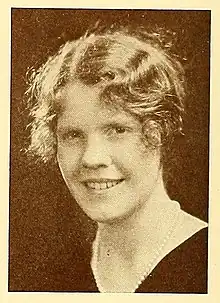Margaret McKelvy Bird | |
|---|---|
 Margaret McKelvy in the Bryn Mawr College Yearbook, 1931 | |
| Born | August 25, 1909 |
| Died | December 28, 1996 (aged 87) |
| Alma mater | Bryn Mawr College |
| Occupation | Archaeologist |
| Spouse | Junius Bird |
| Children | 3 |
Margaret (Peggy) McKelvy Bird[1] (25 August 1909 – 28 December 1996)[2] was an American socialite and archaeologist who, with her husband and partner Junius Bird, undertook significant international expeditions.[2][1] She volunteered at the American Museum of Natural History for over 60 years, where she catalogued and managed the collections they had gathered.[2]
Early life
Margaret McKelvy was born in New York, the daughter of Florence Gloninger Orth and Robert McKelvy, vice president of the Tidewater Oil Company (founded by his father).[3] She attended Brearley School, followed by St. Timothy's School, and Bryn Mawr College, graduating in 1931.[3]
McKelvy met archaeologist Junius Bird in 1931, and the pair married in 1934.[2] They went on to have three sons: Robert McKelvy, Harry Bouton, and Thomas Lee.[4][5] Upon their marriage, the couple travelled to Hopedale, Labrador, where Junius Bird was undertaking archaeological work.[3][6]
Career
Following their time in Labrador, the Birds travelled to Southern Chile.[7] Writing to the Bryn Mawr Alumnae Bulletin in 1935, Margaret's mother reported:
My daughter, Margaret McKelvy Bird, is in Southern Chile with her husband, Junius Bird, both being sent to do archaeological work by the American Museum of Natural History — to be away two years. They left on the 9th of November. They have their own sailing boat on which an engine has been installed, which they bought at a port south of Valparaiso. They are cruising among the islands in the inland waters — expecting to reach Magellanes very soon, — their objective being to discover remnants of the earliest civilization in that part of South America.[8]
This was the beginning of a lifelong partnership in archaeological work, during which Margaret went from observer and supporter to active planner and participant.[2] Gordon Willey wrote in a biographical sketch of Junius Bird that Margaret "proved herself a formidable ally right from the start, flourishing under the conditions of a 1,300-mile trip in a nineteen-foot sailboat as well as journeying across the flats of far southern South America in a wind-driven Ford car."[1] Additionally, she kept detailed field journals on the couple's expeditions, her "witty, charming, and personable" writings conveying "the more human aspects of [Junius] Bird’s research while reinterpreting his theoretical ideas."[1]
With Junius Bird, Margaret worked on excavations in Argentina, Patagonia, Peru, and Chile, including at Canadon Leon, Cueva Fell and Pali-Aike.[1]
Later years
Junius Bird died in 1982 at the age of 74.[4] Margaret McKelvy Bird died on 28 December 1996, and was buried with her husband in Greenwood Union Cemetery, Westchester County, New York.
References
- 1 2 3 4 5 Bird, Junius Bouton (1988). Travels and archaeology in South Chile. Internet Archive. Iowa City : University of Iowa Press. ISBN 978-1-58729-014-5.
- 1 2 3 4 5 "Margaret McKelvy Bird". Trowelblazers. 2014. Retrieved 2023-03-12.
- 1 2 3 "Margaret McKelvy is Junius Bird's Bride in Garden Ceremony". The Daily Item. 4 June 1934. p. 8.
- 1 2 Chira, Susan (1982-04-04). "JUNIUS BIRD, 74, ARCHEOLOGIST; AN EXPERT ON SOUTH AMERICA". The New York Times. ISSN 0362-4331. Retrieved 2023-03-12.
- ↑ The annual obituary, 1982. Internet Archive. St. James Press. 1983. pp. 160–161. ISBN 978-0-912289-01-4.
{{cite book}}: CS1 maint: others (link) - ↑ "PROOF OF NORSEMEN IN LABRADOR SOUGHT; Explorer and Bride Leave Next Week to Hunt for Traces of Civilization Near Arctic". The New York Times. 1934-06-07. ISSN 0362-4331. Retrieved 2023-03-12.
- ↑ "Through Her Eyes - adventures of Margaret McKelvy Bird, Margaret Mckelvy Bird |... | bol.com". www.bol.com (in Dutch). Retrieved 2023-03-12.
- ↑ Bryn Mawr College. Alumnae Association (1935). Bryn Mawr Alumnae Bulletin, 1935. Special Collections Bryn Mawr College Library. Bryn Mawr, PA: Bryn Mawr Alumnae Association.